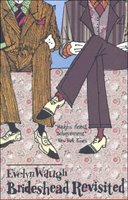Brideshead Revisited

As editor, I'm proud to say that TKR has been fecund of late. Its contributors have been working hard at penning new reviews and the results are there for the readers to enjoy. Perhaps it's the spirit of Christmas in the air... Anyway, here is a review of mine on Evelyn Waugh's Brideshead Revisited, which admittedly doesn't interact with the book itself much at all. - RD
In a novel, propositions are not stated. Generalized, abstract truths are not explicated. If they are, they come as part of the story or in dialogue. They appear through the concrete and discrete images, characters, events and reflections that occur during the course of the narrative – rather as light appears in the cracks of a thatched basket when held up to the sunlight. A reviewer can call into question the ideational foundation from which the author writes and the conclusions reached, but can he or she truly criticize the narrative – in other words, the “artifice” of the novel – itself? How should he or she approach the task of criticizing the novel’s “agenda” if that agenda appears in the actions of the characters, especially when there are diverse crosscurrents in the behaviors and thoughts of those characters, such that flat statements describing the author’s purpose are difficult to justify? Finally, in what sense can a reviewer sum up the book’s theme, when abstracting a sublime “meaning” from the book only serves to contort the very particularity which made the book an enjoyable work of art in the first place? It is to these questions that my mind turns as I contemplate writing a review of Evelyn Waugh’s Brideshead Revisited.
Beauty cannot long live detached from a particular object, place or time. When we label a novel a “classic,” it is not merely because it provides a perceptive social commentary, that it presents an ingenious new philosophy, or even that it contributes to the “great conversation” concerning human life, held throughout the ages. In a simple sense, a classic novel – and any classic work of art, for that matter – is termed so because it possesses a quality of beauty, of craftsmanship and excellence, unparalleled among its contemporaries and, potentially, its progenitors and successors. Waugh’s Brideshead Revisited, though one of his signature achievements, is more of a modern classic; reaching the upper echelon of “classic” classics is the job of a much more important book. Nevertheless, as I think back on Waugh’s book, it does have a certain quality of beauty in it that is hard to duplicate and is not often seen in more recent material.
Waugh is known to be a critic of the modern society, or one where civic life and culture is stripped of its religious content. He knows that this type of society is devoid of the deeper qualities of life – those that make it worth living. His main character, Charles Ryder, is also the narrator and the reader gets the impression that he is not happy with his atheistic inclinations. He watches with caustic wit as his friends, the Flytes, make often ridiculous gestures in order to live out their Catholic convictions. But by the end, he also notices a certain beauty and meaning lacking in his own life.
This is but one theme that caught my attention. Waugh employs many others, including romance, war, friendship, the early-20th century English class system, and the Arcadian quality of youth that we invent for our memories as we grow older. Some of these are worked out more fully and interestingly than others. The plot (which is guaranteed to bore or irritate its audiences come next year’s theatrical release – I could write a whole review on the unsuitability of this book for film) is merely a mechanism for the characters to interact and for the narrator to muse. But the wizardry of Waugh’s pen is what I found most engaging about the book. The publisher’s blurb on the author included a quote declaring his work to be lapidary. That is a fitting term. Waugh writes incisively but also beautifully – evoking images that stir the mind and the heart. He is also quite humorous; I found myself laughing out loud on several occasions. Paradoxically, his brevity often produces a more fully developed image than would a prolix account. Perhaps this is due to his very English prose, with its precision that far exceeds many of Waugh’s American contemporaries.
Returning to the questions I posed at the beginning, should I judge the book based on its themes or its art? This is a perennial question and one that I bring up not to answer but to consider. I enjoyed reading Waugh and listening to the narrator and characters interact. This book comports well with those who enjoy the art(ifice) of literature. Those who read it for plot intrigue or who try to mine it for underlying philosophical breakthroughs may come away a bit disappointed. Nevertheless, it bears mentioning that his themes are still relevant today, more than sixty years after the novel was written.
- Roger Dixon


3 Comments:
Hey I'm glad you finally picked up Waugh after several years of urging. Better late than never!
I have a couple questions that I'm sure will go unanswered (like the rest).
1. You referred to him being both droll and meloncholy, but I wonder if it would be better to describe him as wry? That's the feeling I always come away with... a dashing curmudgeon who still knows how to have a little fun.
2. I may be wrong, but I always thought artifice had a more negative tone like deciet and chicanery, and that the meaning "skill" is insofar as it is somewhat crafty?
3. I realize that the book does not conform to the hackneyed style of predictable Hollywood fare, but neither does Wes Anderson. I think there are movie writers who are just as wry and banal as Waugh. FYI: some of his books have more enthralling plot development.
Pommes: No, no, no, I can't let you have credit for turning me on to Waugh. That honor goes to the fine journalists at the Institute of Religion and Public Life, better known as the editors of First Things. In regards to:
1. I thought I mentioned that Waugh made me laugh quite often. I do agree with you, though: wry would be a fine adjective to describe his writing.
2. Artifice may have negative connotations in contemporary parlance. However, as you know, words often change their meaning over the years, or as they disseminate into wider usage (i.e. "peruse"). I believe that the term "art" derived from "artifice," in that humans imposed form on relatively formless nature. Many of the temples in ancient Greece (so I'm told) present a striking counterpoint to the wild brush and hillsides. All this to say that I like the term artifice and I think it's appropriate.
3. You may be correct about the adaptability of some aspects of this book to film. If the director focuses on what he should, it may be a viable project. I should have been more clear that the style of the prose will be hard to translate into film and that unless there are a lot of voiceovers (not necessarily a good thing for a movie), much of the narrator's thoughts will be lost.
Thanks for the comments. I hope there's another review in the works... (Reporting on the Civil Rights movement?, etc)
You are very keen--I have a review on the civil rights in the pipeline. However, I have one stipulation: create a new website. When you create a new website and transfer in all the reviews (and comments), the reviews will flow from my fingers like honey.
Post a Comment
<< Home